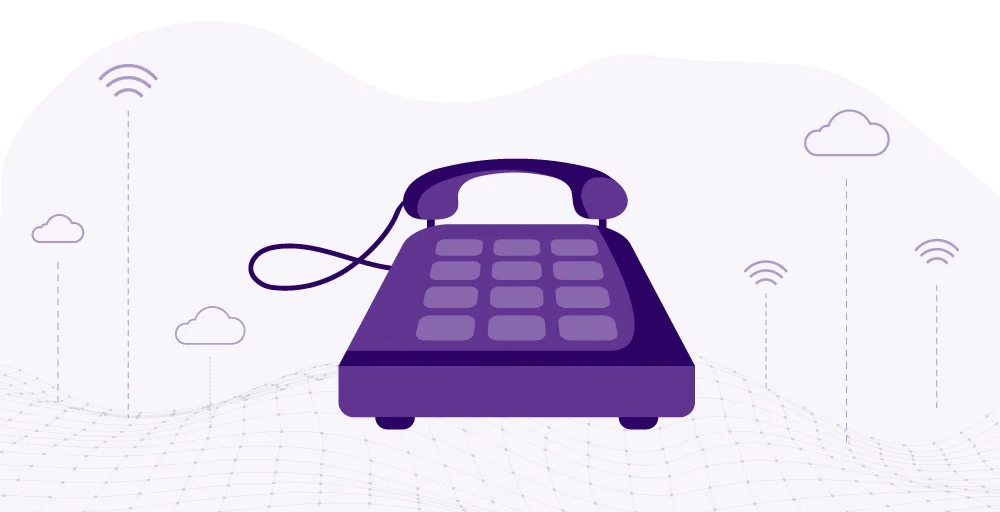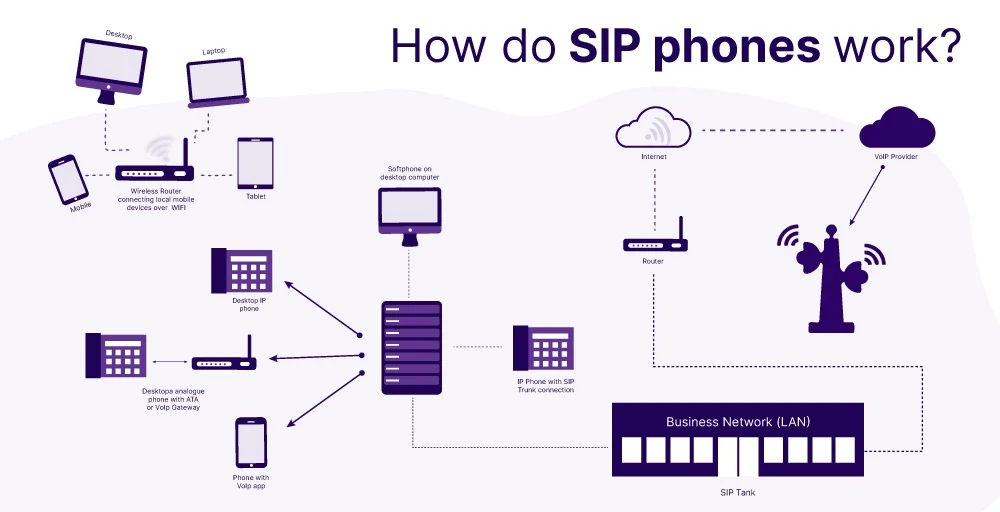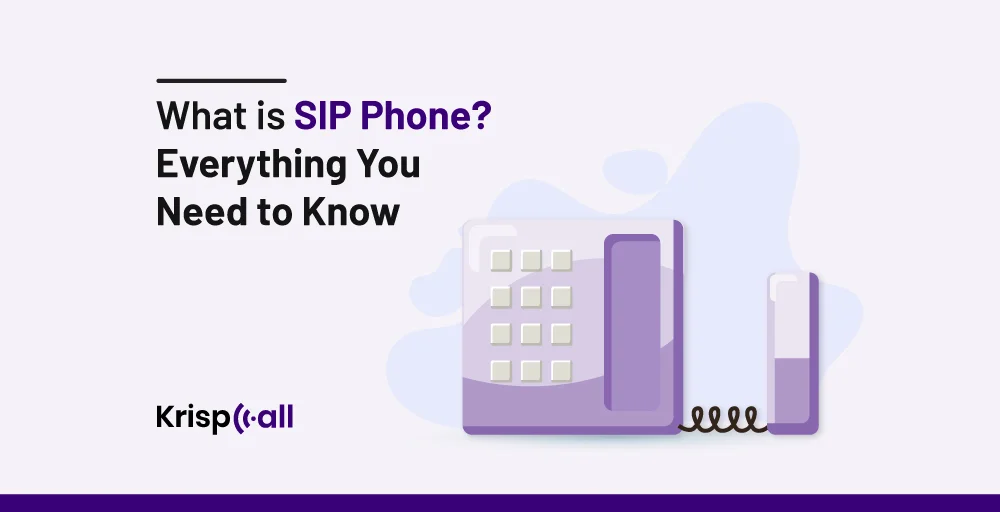Are you tired of traditional phones ☎️ and want to get rid of them? If so, don’t worry; we have an ideal replacement for them.
Introducing the SIP phone, a future telephone which will help you to take the communication with your customer to new heights.
Likewise, Session Initiation Protocol (SIP) phones use Voice over Internet Protocol to make and receive calls and transmit voice data.
This is just a definition, but what is SIP phone, how does it work, what are the benefits, and how do you set it up?🤔
As a business owner, you must be asking those questions. So don’t panic; we have got you. This blog provides the answers to all. So, without wasting a second, let’s delve into this web blog.
🔑 KEY HIGHLIGHTS
- Session Initiation Protocol (SIP) phones allow users to make and receive calls through the Internet.
- Various individuals and organizations use SIP phones for real-time voice, video, and other media communication via the Internet.
- SIP phones provide businesses with essential features, such as call forwarding, on-hold music, call recording, HD audio, and more.
- The Cisco IP phone series, Grandstream IP Phone series, Yealink SIP series, and Poly SIP phone Series are some of the best SIP phones available.
- Call Quality, Service Reliability, Security, and Customer Support are some tips you should consider before choosing a SIP telephone service provider.
What is SIP phone?

Session Initiation Protocol (SIP) phones allow users to make and receive calls through the Internet and transmit voice data through Internet Protocol (VoIP) technology.
Also, SIP phones provide several advantages over traditional phones, including lower costs, advanced features, and wideband audio or HD voice.
Likewise, SIP phones are available in two types: hardware and software. Hardware SIP phones are dedicated devices that look like traditional phones but utilize IP telephony through a VoIP provider.
Moreover, Software SIP phones are software applications that can be installed on computers or mobile devices. These applications are downloaded and used to connect with a SIP service provider, allowing users to make and receive phone calls.
Who uses SIP?
In today’s evolving tech world, many people use phones daily. Various individuals and organizations use SIP phones for real-time voice, video, and other media communication via the Internet.
In the same way, SIP users can access their VoIP service from any device, anywhere in the world, using their unique SIP user credentials, which include a username, password, and domain.
Equally important, SIP is used in various applications, such as VoIP calls, video conferencing, instant messaging, and online games. Likewise, transport-level protocols like TCP, UDP, and SCTP can execute SIP phone calls.
Correspondingly, SIP clients typically send traffic to servers and other endpoints via TCP or UDP on ports 5060 or 5061. In addition, Businesses use SIP for efficient, scalable, unified communication, mobility, and security.
Types of SIP phones
SIP phones allow users to make and receive calls and send voice data using Voice over Internet Protocol (VoIP) technology. Some of the types of SIP phones are:
1. Software SIP phones
Softphones are software-based SIP phones that can be installed on computers or mobile phones. These can make and receive calls through the device’s microphones and speakers.
2. Hardware SIP phones
Hardware SIP phones are physical phones that look and function like traditional phones but are directly connected to the data network rather than standard PSTN lines. They have an integrated mini hub to share the network connection with the computer.
3. Analog Phones vis ATA adapter
An ATA adapter can connect an analog phone to a VoIP system, allowing it to function as a standard SIP phone.
SIP phone features
There are some unique and impressive features that attract businesses and other people to use SIP phones. Some of its essential features are:
- Call Forwarding: Whenever you are busy or can talk to the caller, the call forwarding feature lets you forward the same call to a different available person without missing a call.
- On-hold Music: Callers get bored when holding a call for a long time and may even disconnect it. So, a SIP phone has a feature that provides on-hold music to keep callers engaged.
- Wifi-Calling: SIP telephones run through the Internet, allowing users to communicate through Wi-Fi without using traditional phones.
- Call Recording: SIP phones provide users with a fantastic call recording feature. With this feature, you can record business calls for reference and use them for training.
- Unified Communications: Combining the phone system with other communication channels like email, instant messaging, and video conferencing can create a seamless communication experience with SIP phones.
- Shared call appearance: Many customers can call you simultaneously if you run a business. To ensure that your business number is always available, you can easily share it with an SIP phone so that someone remains available to pick up the call.
- HD audio: Audio quality plays a vital role when communicating with a customer or in a conference call. Similarly, SIP phones provide HD audio with crystal-clear sound quality, improving communication.
- Power over Ethernet: A PoE VoIP phone, like the SIP phone, minimizes the need for different cables to supply power by sustaining the phone directly through your network cable.
How do SIP phones work?

Every phone system has its own working mechanism, and so do SIP phones. The working mechanisms of SIP phones are listed below:
- To place a call in a SIP, a user picks up a phone’s handset and dials a number.
- Then, The SIP telephone sends an invitation message to the SIP server where it is registered. Similarly, this message shows that the user wants to start a call.
- After that, the SIP server manages the invitation request, routing the call to another extension on the same SIP server or connecting both sides to the Public Switched Telephone Network (PSTN).
- Once the person dialed responds, the two SIP phones exchange information to establish two-way audio communication. Correspondingly, they agree on the encoders and bandwidth to use.
- When an individual hangs up, a SIP “bye” message is sent to both parties, dismissing the call and disconnecting the media session.
The good news is that almost all users and IT administrations will never have to deal with the SIP protocol’s complexities.
VoIP vs SIP. What is the difference?
Some of the difference between VoIP and SIP are listed below:
| Voice over Internet Protocol (VoIP) | Session Initiation Protocol (SIP) |
| VoIP is mainly used to make calls over the internet. | SIP is a protocol that sets the rules for VoIP communication. |
| VoIP only supports voice calls. | SIP supports voice calls, video calls, instant messaging, and faxing. |
| VoIP can handle basic voice calls without needing SIP. | SIP is necessary for advanced features and flexibility. |
| Making Calls is more affordable and convenient. | SIP features make it costlier than VoIP. |
Benefits of using SIP phones
Using SIP makes your communication smoother without any disturbance. Below are some of the benefits of using SIP phones.
- Cost-effectiveness: SIP phones have low monthly costs for VoIP systems, resulting in savings that can be reinvested in your phone system.
- Scalability: SIP technology allows easy expansion by purchasing additional phone lines and hardware as needed, with upgrades taking minutes rather than weeks.
- Mobility: SIP telephones enable users to connect their phones to an internet connection and use them anywhere, leading to mobility.
- User-friendly performance: SIP calling is relatively simple to set up and maintain, with online management panels making it simple to manage call technology throughout the organization.
- Integration: To improve communication efficiency, SIP phones can work with various enterprise telephony capabilities, including Outlook contacts, CRM systems, and business applications.
- Continuity: SIP phones enable call transfers and forwarding, ensuring continuous communications and avoiding disruptions in business operations.
- Easy Maintenance: SIP providers provide tools for monitoring call quality and quickly rerouting services in case of an issue, ensuring consistent communication.
- Improved Sound Quality: To improve call quality, SIP telephone service providers provide access to advanced audio technologies such as HD voice, wideband audio, and noise-canceling capabilities.
Best SIP phones
In the telephone market, there are many SIP phones that are ranked among the best. Some of the best SIP phones are:
1. Cisco IP phone 6800, 7800, 8800 series
One of the best SIP phones in the market is the Cisco IP phone series, which has a rating of more than 4.5 stars. Similarly, Cisco provides various hardware, software, and other telecommunication equipment, but the company has recently gained recognition for producing some of the best VoIP business phones.
🧾Specification:
- Cisco phones are wired phones.
- Encrypted communications
- Fully programmable line keys
- Unified communication features
✅ Benefits:
- It is easy to use for business and training purposes.
- It consumes low power.
- It offers the best voice quality.
- The hardware used in these phones is reliable and recyclable.
2. Grandstream IP Phone GRP, GXP, GXV series
Grandstream Networks provides IP voice and video communications equipment to businesses and consumers. Similarly, its GRP, GXP, and GXV models are excellent choices for those who require a high-quality VoIP handset.
🧾Specification:
- Grandstream IP Phones are also wired phones.
- It supports 3 lines, 3 SIP accounts, and 4-way voice conferencing at a time.
- Grandstream has 8 speed dial keys.
- GRP, GXV, and GXP phones contain a 2.8-inch LCD screen.
- These phones are HD audio speaker phones.
✅ Benefits:
- Grandstream IP Phones benefit your business by improving the quality of calls between a caller and a customer.
- A big, bright LCD touchscreen lets you control the overall meeting from one screen.
- Its Conference Calling functionality allows you to make changes while attending or organizing a conference call.
3. Yealink SIP T2, 3, 4, 5 series
Yealink is a communication equipment company that provides modern businesses with the collaboration tools they need to connect with clients and customers worldwide. Likewise, it offers various VoIP and SIP phones at multiple prices, so there is likely to be a device that suits every budget.
🧾Specification:
- Like every Cisco and Grandstream phone, Yealink SIP phones are also wired.
- Yealink SIP phones support up to 12 SIP accounts on some models.
- Wifi and Bluetooth adapters are compatible with these phones.
- USB recording and Unified Firmware are the unique features that set these SIP phones apart.
✅ Benefits:
- With multiple VoIP accounts, you can easily organize a team meeting of 10-12 members.
- Bluetooth-enabled models connect Bluetooth devices, and USB recording lets you connect external devices via USB and record meetings directly to an external storage device.
- Yealink SIP phones are affordable, easy to set up, and have low latency.
4. Poly V, C Series
Poly SIP phones continue to manufacture audio communications equipment for businesses and customers. Similarly, its phones are widely recognized as among the best available. Poly SIP phones were also known as Polycom.
In addition, the company offers two main lines of IP phones: the V and C series of devices. While the C series is designed for employees working from home or in the office, the V series includes several features to increase customer engagement in call center environments.
🧾Specification:
- Poly SIP phones are Wired.
- These phones are gesture-based and have multitouch capabilities.
- Poly SIP telephones have a wide 7-inch color LCD display.
- With its big screen, it also has a screensaver and an on-screen virtual keyboard.
- It supports Voicemail, which makes Poly SIP phones different from others.
✅ Benefits:
- Poly SIP telephones are easy to set up and install.
- A large LCD screen offers the user more visibility.
- These SIP landlines can integrate with Bluetooth and PC functions.
How to set up SIP phone?
To set up SIP phone, follow the below steps:
1. Choose Your SIP Provider
First, before setting up your SIP phone, you should choose an SIP-based calling service provider. You can select a provider based on pricing, features, and services that best meet your needs.
2. Obtain SIP Account Credentials
After selecting the SIP service provider, you can sign up for an account and obtain credentials.
The account credentials contain the SIP server address (e.g., 1-999-123-4567), Username/SIP ID, Password, and authentication details (For example, [sip:[email protected]](mailto:sip:[email protected])).
3. Select Your SIP Phone
So, after successfully obtaining an SIP account, you can choose whether to use a hardware SIP phone or a software application on your phone or computer. Simply select a device or application that suits your requirements and preferences.
- Configure SIP Account on Hardware SIP Phone
When setting up SIP account on a hardware SIP phone, keep a few things in mind. You can connect your hardware SIP telephone to your network using an Ethernet cable and access the phone’s settings menu through the device’s interface.
Afterwards, you can enter SIP account information provided by your SIP provider into the specified fields. Then save the settings and restart your device if necessary.
- Configure SIP Account on Software/mobile SIP Phone
You must first download the software application for software/mobile SIP phones from the appropriate website or app store on your device. After that, you can enter the SIP account information provided by your SIP provider into the designated fields.
Moreover, software/mobile SIP phones have additional configuration options for audio codecs, SIP ports, and transport protocol (UDP/TCP/TLS). Lastly, save your settings and exit the setup menu.
4. Testing the system
After successfully installing SIP phones and logging in, you may test the SIP cellphone service system by dialing a number using a keypad, creating a call, trying out each incoming and outgoing call, and checking if the device is configured well; you can also organize a test conference assembly.
5. Adjust Settings and secure your SIP phone
After you complete system testing, adjust the SIP phone’s settings according to your preferences. These settings may include audio settings, display settings, call recording, call forwarding rules, and more.
After setting up a SIP phone, you should know how to use a SIP phone. You can follow the steps for using a SIP phone:
- First of all, you must have an Internet connection.
- Configure a SIP account.
- You can choose between hardware or software phone.
- After selecting the SIP phone, you can enter the number you want to dial and enjoy the call.
- For incoming calls, you just need to accept the call and answer the call.
- You can also use additional features such as call forwarding, call recording, conference calls, and more for incoming and outgoing calls.
- After all those calls, you can monitor the details of the calls to analyze the data.
Lastly, the crucial thing is securing your SIP phone from hackers. You can implement different security measures, such as encryption, strong passwords, and firewall configurations, to protect your SIP phones from unauthorized access.
Tips to choose the best SIP phone service provider
Are you confused about what to do and not to do while choosing the best SIP phone service provider? Likewise, the best SIP service providers are essential for seamless communication. However, before selecting the best SIP phone service provider, remember some tips that may help you get the best service provider. Some of the tips are:
1. Call Quality
Quality of service (QoS) is the key to precise and consistent voice communication. Most businesses lose money due to low call quality, so the first important tip is to check the call quality. Correspondingly, choose a provider that prioritizes call quality and offers high-definition audio, codecs, and network redundancy.
2. Scalability and Flexibility
You must consider the future and changing customers’ needs while choosing service providers. So, you should select the SIP phone service providers that meet the scale of your business according to its needs and provide flexible plans accordingly.
3. Security
Generally speaking, all these customers bring valuable data and information, and protecting it is essential. You can choose an SIP provider with solid security measures, such as encryption, authentication, and network security protocols. Likewise, you can also look for recognition of industry standards and regulations, e.g., HIPAA and GDPR.
4. Customer Support
As a matter of fact, reliable customer support is critical for resolving problems and obtaining support when necessary. As a business owner, you can evaluate the provider’s customer service options, such as support availability, response times, and support channels, such as phone, email, and live chat.
5. Cost and Price structure
There are several SIP phone service providers, each with a different cost and pricing structure. You can compare the pricing and the solution each service provider offers and choose the one that matches your requirements.
6. Reviews
In this competitive business market, many SIP phone users may have already given their reviews about their SIP service providers. So, you can read all those reviews, which may be good or bad, analyze the service provider, and choose the best one for your business.
Conclusion
SIP telephones are the new generation or the future of communication. SIP phones have transformed the way of communication, reduced the cost of calls, flexible and scalable. It also improved customer satisfaction and increased customer engagement.
So, for every business that wants to grow in the future, integrating SIP phones will help you and your business grow and receive positive responses.
As you and your company embrace digital communication solutions, understanding the fundamentals of SIP phones becomes critical for realizing the full potential of modern communication technologies.
FAQ
What is a SIP phone service?
SIP phone service is a VoIP telephony system that implements Session Initiation Protocol (SIP) to establish, operate, and terminate real-time voice, video, and messaging sessions between two or more devices via an IP network.
Is SIP phone same as IP phone?
Although SIP and IP phones are frequently used interchangeably, they are not precisely the same. An IP phone uses Internet Protocol technology to transmit phone calls, whereas a SIP phone is a specific type of IP phone that uses Session Initiation Protocol (SIP) to establish, operate, and terminate real-time voice, video, and messaging sessions between or more devices over an IP network.
Are all IP phones SIP?
No, not all IP phones are SIP. While all SIP phones are IP phones, they do not all use the Session Initiation Protocol (SIP) to establish communication sessions.
Does SIP use the Internet?
SIP uses the internet to initiate, modify, and terminate real-time voice, video, and messaging sessions among multiple devices.
Can SIP calls be traced?
SIP calls can be traced using various tools and methods, including those offered by the miniSIPServer, Cisco Unified Communications Manager (CUCM), and other SIP tracing and logging tools.
Is SIP the same as a phone number?
No, SIP is not the same as a phone number. SIP protocol allows communication sessions, whereas a phone number is a unique identifier to contact a specific phone or device.





